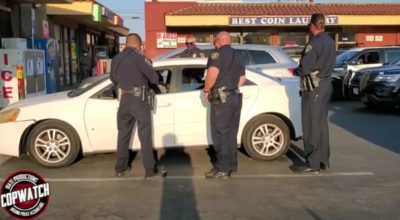
The shooting of an East Ridge policeman following a “traffic stop” brings into view the city’s liability in pushing its employees to enforce state and federal law by force of custom, but not law.
By David Tulis / NoogaRadio 92.7 FM
Cpl. Terry Prescott was injured in the sort of enforcement action the city knows is not lawful for it to enforce. The city has been under Tennessee Transportation Administrative Notice for 879 days as to the limits of the law Cpl. Prescott was ostensibly enforcing in his commercial trucking enforcement encounter Sunday.

Bullets from an out-of-state traveler, Christopher Kitts, hit Officer Prescott before he got out of his cruiser in the arrest, ostensibly under the state trucking law.
Mr. Kitts, 42, of Dallas opened fire after Mr. Prescott turned on his blue lights, which by law can only be done when the officer witnesses a crime or has a warrant for a person’s arrest. The turning on of blue lights constitutes an arrest for 4th Amendment purposes, according to Tennessee case law.
Police routinely use shipping law infractions for their arrest under blue lights, as pretext for criminal investigations and criminal arrest, though the laws in question are administrative in nature and are administered or “enforced” civilly.
Reports say Mr. Kitts opened fire and hit the officer seated behind the steering wheel of his city-owned cruiser.
After a hunt and shootout, officers killed Mr. Kitts. Erlanger hospital released the officer Monday.
Notice seeks to prevent such dangers
East Ridge has been under administrative notice since May 24, 2018. The notice puts the city on awares about the limits and disability of two Tennessee code annotated titles which are routinely used by local police outside of their lawful jurisdiction.
These titles are motor and other vehicles at Title 55 and carriers at Title 65, chapter 15. These bodies of law are routinely used by peacekeeping departments to convert themselves into law enforcement departments. East Ridge is no different than departments across the state in imposing laws upon people outside their scope, wherein since the Ferguson, Mo., riots have put themselves increasingly at odds with public opinion and the long bid to end Jim Crow — race-based rules and lawlessness by cops — in the American states.
The notice makes clear that the regulation of transportation activities is in the hands of the state and federal government. The titles are aligned with U.S.C.§ 49, transportation and insofar as Tennessee agencies enforce the transportation laws of the state, they are exercising a federal authority over interstate commerce and intrastate commerce insofar as it affects interstate commerce.
The Tennessee departments of revenue and safety are responsible for regulating the shipping-trucking-hauling-transportation line of business.
Officer Prescott is under implicit orders (pursuant to city customs and usages, which appear to negate and abrogate all state law) to enforce the revenue law of registration and insurance and also the driver’s licence law which is enforceable by the department of safety. The statute gives the Tennessee highway patrol authority to enforce a driver’s licence rules in chapter 50 of Title 55. The registration laws are “administered,” or enforced, by the department revenue, according to state law.
City government has long been used to violations of these laws because of the revenue stream generated for the city through its city court business, which universally collects a nearly $100 tax on every person brought into the system by police and law enforcement activity.
The court is overseen by an attorney, Cris Helton, elected to the position of judge by members, or residents, of the corporation City of East Ridge.
The injuries to policeman Prescott are under the liability protection of the city. Likely there is no grievance on his part as to his pain and suffering, as he is assured by the city under its insurance policy that his medical costs are covered.
Still, the city had little regard for Mr. Prescott’s personal estate, health, welfare and prosperity. Its customs put him in harm’s way outside the scope of law on Sunday in his probably routine traffic stop.
East Ridge does that for every officer involved in its “traffic enforcement” activities. Every officer is put into the same legal hazard, as if somehow Mayor Brian Williams and city council members Esther Helton, Jacky Cagle, Mike Chauncey and Aundi Whitt pretend that the city has authority to enforce state and federal transportation law.
Mayor Williams and the council might rest easy. The courts have upheld implicitly these activities by refusing to allow appeals to gain any traction making proper legal arguments. Repeated attempts to obtain rulings to verify the distinction between travel and transportation have been rebuffed. Legal fiction and judicial policy control as against numerous cases, as averred in administrative notice, that affirm the right to travel and communicate by private use of the public right of way.
The city allows and sets traffic patrol policy to effectively require officers to violate state law, and to put themselves into the most dangerous kind of citizen encounter. Traffic stops are more dangerous than domestic dispute calls, according to a study by a pro-police foundation.
What if Kitts’ estate sues?
If Kitts family survivors learn about the administrative notice, it is possible they will consult an attorney to see if claims may be made against the city for its “traffic stop” against Mr. Kitts. The notice is usable for just this purpose. In seeking to reduce exposure of officers to violence, My notice seeks to restrain their activities to their two lawful areas of action (ordinance enforcement, peacekeeping).
It intends to save lives — the lives of cop and of the people. It aims to stop widespread police violence, and reduce the cause among the people to protest police activity and demand they be defunded.
Administrative notice and the law emanating from its pages disallow traffic stops by unauthorized parties for unauthorized purposes under pretext of “traffic safety.” If Mr. Kitts was stopped for a dead taillight bulb or a turn into a gas station without using his indicator flasher, that is a pretext “traffic stop” that is ultra vires — or outside the view of the statute. Title 55 is a footwide law, but it’s enforced by cops and deputies as if it were a yard wide.
Mr. Kitts wouldn’t have opened fire if he hadn’t been provoked by the arrest, and Officer Prescott wouldn’t have had to endure danger and injury.
Transportation administrative notice is unrebutted in the jurisdictions upon which it has been served. The document is a matter of public record in Rhea County, and has been notoriously published by reference in Hamilton County. Any party wishing to use the notice will simply have to obtain the proofs of service through this website, or by contacting me.
Attorneys such as Micah Guster, who is defending Daniel Wilkey in the notorious traffic stop baptism case, could use the notice to establish that Deputy Wilkey was being injected into illicit encounters by Sheriff Jim Hammond, who is under the notice, too, as of March 1, 2018, or 963 days ago. That would reduce some of the freight Mr. Wilkey has to carry as civil and criminal defendant, since he can show his employer and boss was knowingly and intentionally violating the constitution and black-letter law by continuing the old practice of Jim Crow traffic stops — upon blacks and whites alike.
Notice deprives state actors of their main defense in lawsuits, that they acted unknowingly and unintentionally, and were merely following custom, training and policy. Notice about limits in the law prevents them from pretending innocence when violating people’s rights.


